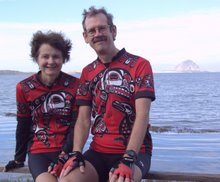Further downstream are four more powerhouses of the industrial revolution in America, Nashua, Lowell, Lawrence and Haverhill, but we chose to turn off at Nashua for Concord Massachusetts, instead. Four decades ago, Jeff used to bike 20 miles from Boston College out to Concord to go canoeing from the South Bridge Boat House, and as we rode into town we swung by to see it and nothing had changed but the prices.

We planned on a 3-day stay in Concord but loved the town and the Mill Brook B&B and its owners Kathy and Jean Paul so much that we extended our stay another night, only the second time since January we've spent that many nights under the same roof.
Concord today is a peaceful town well-deserving its name, but on April 19, 1775 it was anything but. Those of you who remember your Longfellow ("On the 18th of April in '75 / Hardly a man is now alive / Who remembers the famous day and year / Of the midnight ride of Paul Revere...") will recall that Paul Revere, Charles Dawes and other patriots spread word overnight of the approaching Redcoats across Middlesex County. At Lexington Green, which we visited the day after Concord, some 70 patriots stood up to the 700 British troops, but neither side formed a battle line. The Minutemen were just trying to make a statement, not start a battle in which they would be vastly outnumbered. However someone -- it's never been determined who or from which side -- fired a shot, and in moments the Redcoats started firing without an order to do so, and killed 8 Lexington men.
On they went to Concord, searching for hidden arms and gunpowder. They split up into small detachments, and one group was guarding the Old North Bridge

when smoke was seen from town, a half-mile away. A group of patriots confronting them on the opposite shore thought that Concord was being torched (actually it was only some gun carriages on fire in the town square), and for the first time an order was given to Americans to fire on the King's troops.

Some years later, Concord resident Ralph Waldo Emerson immortalized this moment as "The shot heard 'round the world," and later still sculptor Daniel Chester French (yet another resident of this talent-rich town) symbolized the start of the Revolution with his powerful symbol of the citizen-soldier. Three Redcoats died at Old North Bridge, the first of five dozen that day

(and another 200 wounded) as the patriots followed them, fighting guerrilla-style, back to Boston.
As if this wasn't enough history for the town, it went on to become the focus of a philosophical revolution six decades later, Transcendentalism. Ralph Waldo Emerson was the central figure and a link between the two movements, as his grandfather's home was next door to the Old North Bridge and Emerson was the chosen speaker at Concord's Bicentennial Celebration (in 1835!), a few Minutemen sharing the dais with him. But it was Emerson's friends friends and neighbors Henry David Thoreau and Louisa May Alcott who are better remembered today.
While Ms. Alcott's home is open for tours, it's Thoreau

who gets noticed more, with Thoreau Street a major street in town and Walden Street and Walden Pond reminding people of his most famous work. We walked down to Walden and around what is almost certainly the most famous pond in America. In winter it

looks much like it did 172 years ago when Henry built a small cabin and spent time there thinking and writing (across the road is this recreation of his cabin, set up as he describes it in his book), but in summer this is Concord's town beach!

Nonetheless, extensive hiking paths along the pond and in the nearby woods were mostly quiet and still suitable for thinking and writing for those so inclined.

Back at the Boathouse, we took a second canoe trip up the Sudbury River past extensive wetlands full of wildlife and water lilies,

and Jeff went back a third time on our extra day in Concord for a solo kayak trip

while Louise went by car 20 miles with our innkeeper to her hairdresser for a much needed visit. It was nice to be able to go to someone that was recommended in the best possible way -- by patronage.
Properly cleaned up (Jeff visited Jean Paul's barber as well, though it was an easier trip there -- 3 doors down from the B&B), we set out for Louise's ancestral home of Weston Massachusetts. We went down the street she grew up on from age 11 on (the house she lived in before that was demolished to build a toll plaza on the Massachusetts Turnpike in 1956), and many of the houses had disappeared and been replaced with much larger versions of themselves as Weston follows the megamansion building pattern of wealthy suburbia.

But the old homestead -- if you can call a mid-50s split level that -- was much as she remembered it. We then rode over to the town cemetery to pay our respects to her parents and to other Cutter relatives,

including these two Cutter men who paid the ultimate price in the Civil War.
It's now back to the shore once again, this time to the rocky coast of Massachusetts north of Boston, followed by a ride north along New Hampshire's short coastline and into southern Maine before we do a dog-leg left to Durham NH and the Eastern Tandem Rally on August 1. We'll try to post one more time before the rally, if we can get computer time at a library or elsewhere.


No comments:
Post a Comment